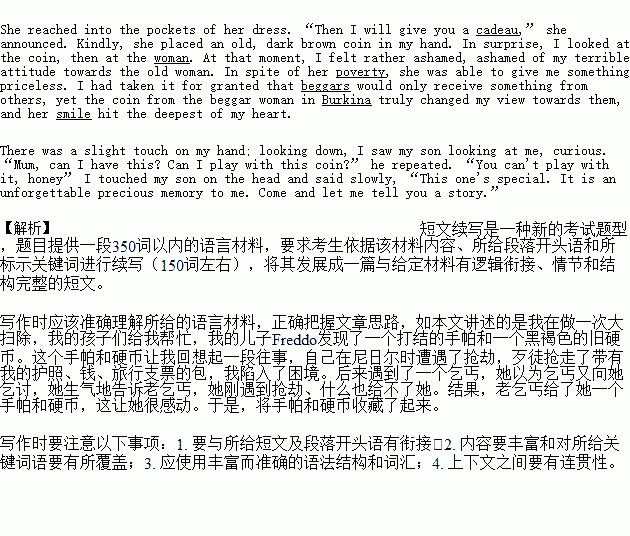题目内容
I was doing a big clean-up recently and my kids were helping when my son, Freddo, came across a knotted handkerchief with an old dark brown coin inside. “Mum, can I have this? Can I play with this Coin?” he asked I took one look and was immediately transported to another time.
In 1991, there was a time when my friend and I worked in a backward African country, Niger, hit by sandstorms and burning heat. There were many things I found difficult about this place—the climate and beggars were my biggest headaches. So after finishing five months of nursing work there, we moved on to work at a health clinic in neighbouring country, Burkina Faso. “It's much greener in Burkina. Even the Coke tastes better,” the locals assured us.
Yet the fact was quite the opposite. Arriving by taxi at our destination in Burkina, we began to unload. I was reaching for my larger piece of luggage when, out of the darkness, a motorbike with two men approached slowly. Without warning, one of the men grabbed my daypack as the motorbike swept close by. Within seconds, the pair were out of sight, swallowed up by the night.
With my passport, money, traveller's cheques all in the bag, I was in deep trouble. How frustrating! All I wanted was to leave this hellhole! Then, walking through Burkina's streets one day, I was stopped by an old woman who thrust her hand in my face. “Cadeau (‘gift’ in French)! Cadeau!”she cried. I'd had enough! I was extremely tired of the country: its poverty, its thieves, the heat, the dust and...everything! I told her angrily and firmly in French, “I have no ‘cadeau’. I have no money. A thief stole all my money two weeks ago and now I can't get out of your country. I cannot give you anything. NOTHING!”The beggar woman listened attentively. To my great surprise, after hearing my words, she gave a broad smile.
注意:
1.所续写短文的词数应为150左右;
2.应使用5个以上短文中标有下划线的关键词语;
3.续写部分分为两段,每段的开头语已为你写好;
4.续写完成后,请用下划线标出你所使用的关键词语。
She reached into the pockets of her dress.
____________________________________________________________________________________________
____________________________________________________________________________________________
____________________________________________________________________________________________
____________________________________________________________________________________________
____________________________________________________________________________________________
____________________________________________________________________________________________
____________________________________________________________________________________________
____________________________________________________________________________________________
______________________________________________________________
There was slight touch on my hand; looking down, I saw my son looking at me, curious.
____________________________________________________________________________________________
____________________________________________________________________________________________
____________________________________________________________________________________________
____________________________________________________________________________________________
____________________________________________________________________________________________
________________________________________________________________________
 阅读快车系列答案
阅读快车系列答案

 password to change my life.” It ______ me,reminding me that I shouldn’t let myself be a(n) ______ of my recent breakup and that I was strong enough to do some
password to change my life.” It ______ me,reminding me that I shouldn’t let myself be a(n) ______ of my recent breakup and that I was strong enough to do some thing about it.
thing about it.